STEAM Professional Learning Sessions





Based on a book using the Reggio Emilia approach, we encourage children to express their creativity as they discover, collect, sort, arrange, experiment, and think with found and recyclable “stuff.” Children will use found materials to build, create, and transform objects into works of art while expressing their ideas and interests.

Makedo is hands on STEAM learning that teaches the design process, helps build collaboration, and encourages creativity and confidence. These kits are open ended tool sets that allow students to create with upcycled cardboard. Students can create and build anything they can imagine, or they can be used to work on a design challenge. Participants will learn how to implement these kits in their classroom or makerspace.
Sphero indi robots introduce PK-2 students to the basic computational thinking while nurturing collaboration and problem solving skills. These screenless robots allow students to start learning introductory coding concepts with color coded tiles. Once students have mastered the fundamentals of screenless coding, they can learn basic block coding via the Sphero EDU Jr app.
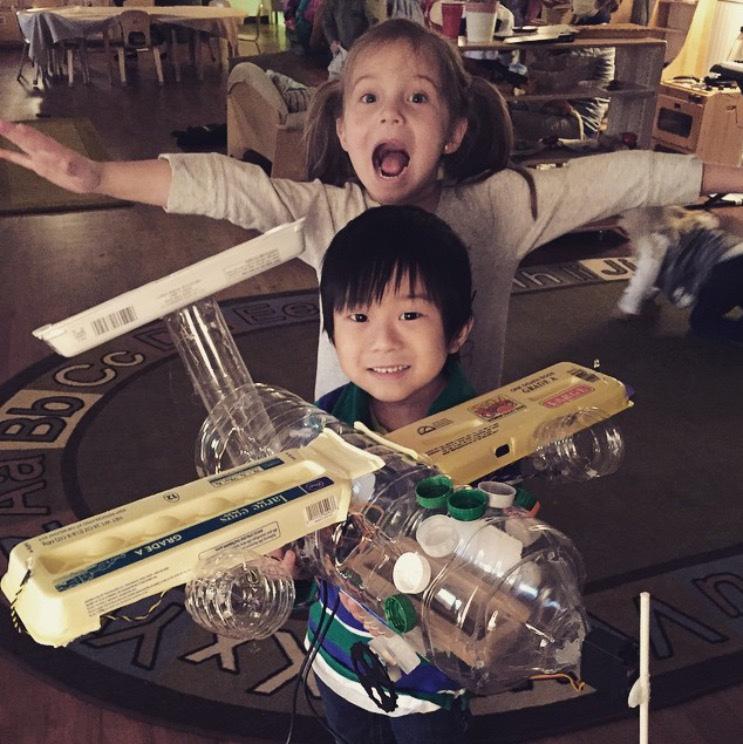
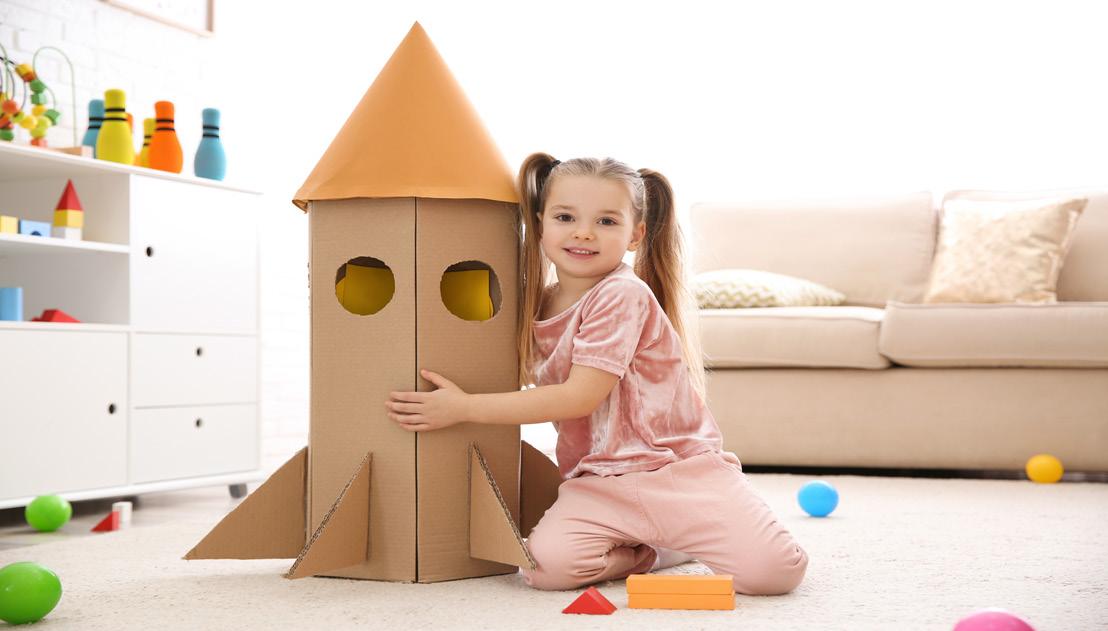

Children’s Innovation Project (CIP) engages young children in exploration and innovation with technology through hands-on exploration of electronic toys and components. Students disassemble, repurpose and reconfigure, empowering them with new understanding. Children who participate in CIP learning progressions develop language, experience new vocabulary, and explore and learn about electricity and simple circuits through engagement with a kit designed for young hands.
The teachers enrolled in this program will participate in more than 80 hours of in-person professional learning that is focused on the elementary math curriculum standards. These standards are divided into 5 clusters requiring 12 days of interactive professional learning.

The educators who are participating in the program will be following guidelines similar to those required for National Board Certification. They are expected to video a lesson related to each of the 12 professional learning sessions and the aligned standards. In addition, they will provide the lesson plan that corresponds with each video and student samples of work related to each lesson. The educators will also write a detailed reflection of their video lesson. These reflections and resulting
discussions will help assist the teachers to further develop the mathematical teaching capabilities they are gaining through the professional learning sessions.

The June Harless Center Elementary Mathematics Credentialing Program will impact the student’s mathematical learning at the earliest levels leading to stronger math students at the upper levels.

“The elementary math microcredentialing program from the June Harless Center is producing fellows who are embracing mathematics in the K-5 setting. The selfreflection component is producing strong and confident teachers who are rediscovering their passion for education.”
--Dawn Dooley Director of Elementary Schools/AssessmentFayette Co.
VEX IQ is a programmable, snap-together, robotics system. By familiarizing students with robotic system programming, sensors, and automation, they hone critical computational thinking skills needed to succeed in both the 21st century’s workforce and in everyday life.
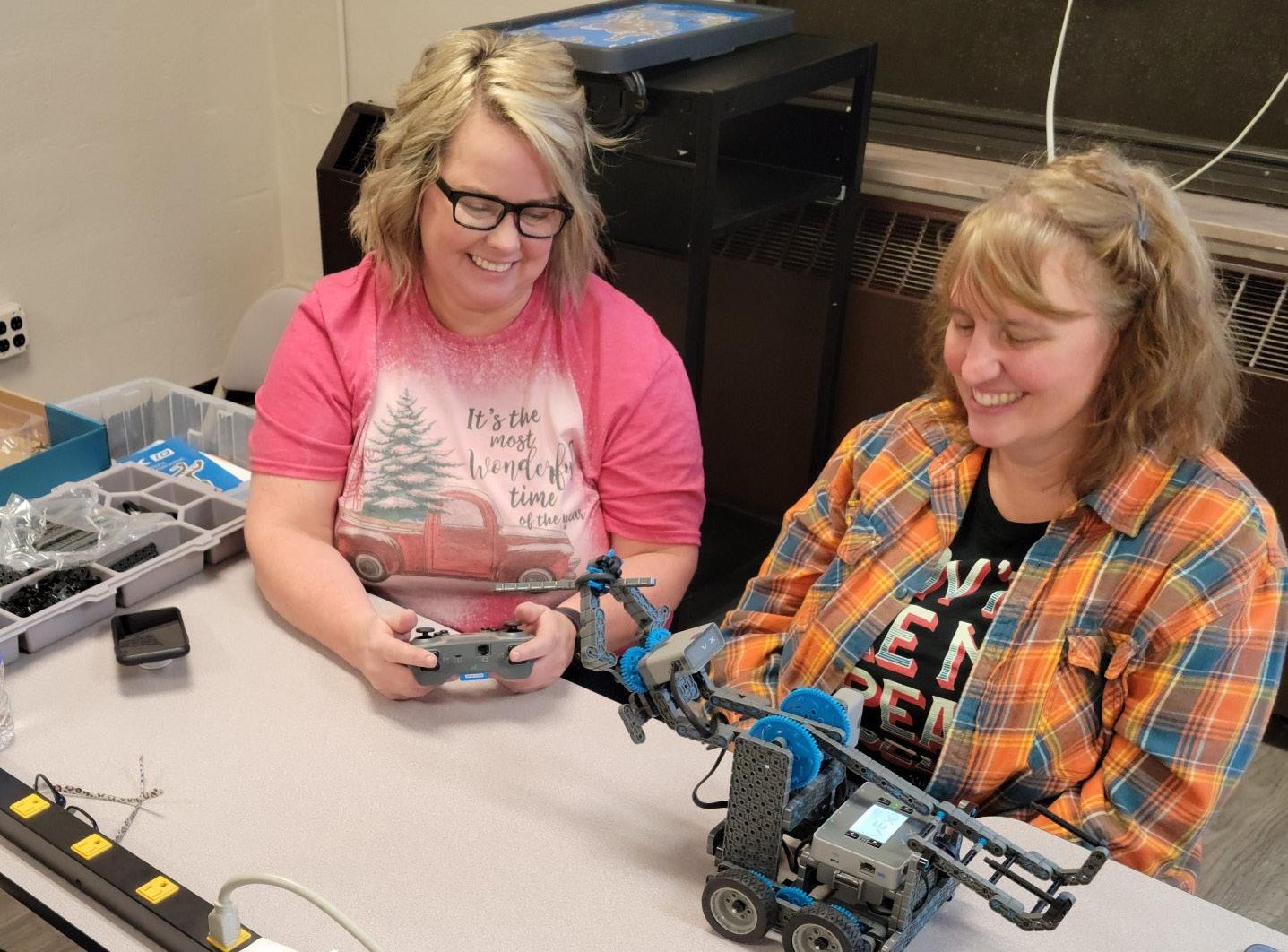
Beyond science and engineering principles, VEX Robotics solutions encourage creativity, teamwork, leadership, passion, and problem-solving among groups.
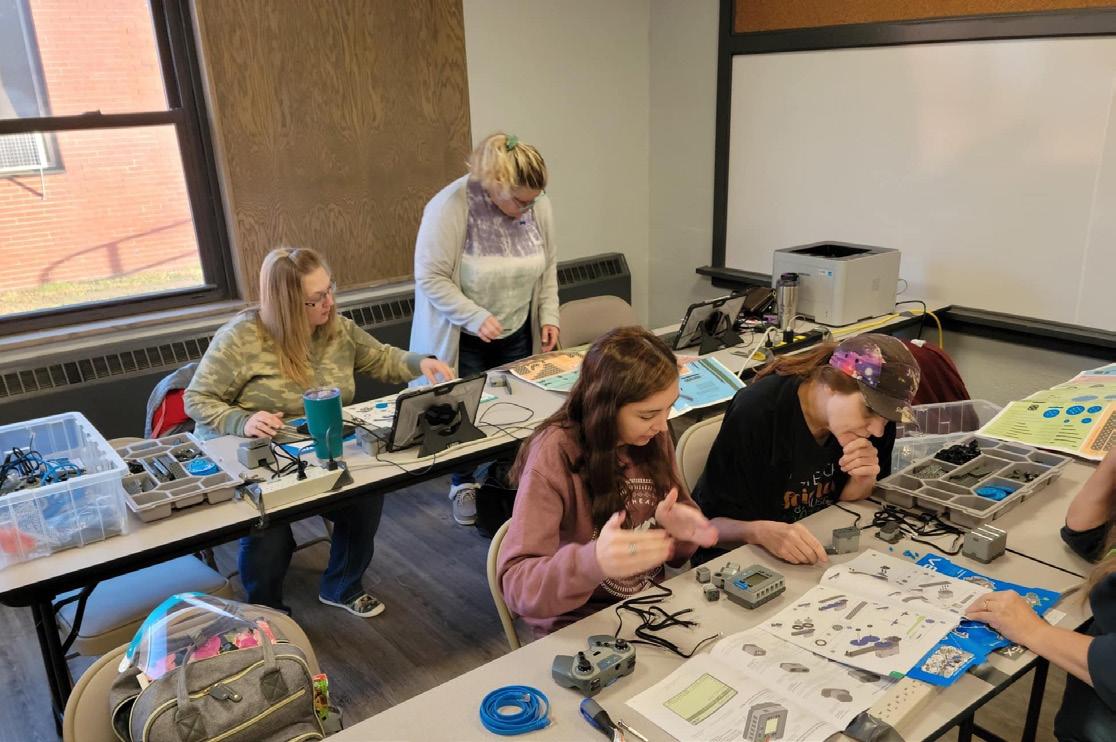
These sessions familiarize participants with the VEX ecosystem and allow them to construct and program multiple builds. The intuitive VEXcode IQ software is utilized to give students at any level access to coding.
The VEXcode VR coding environment is also featured in this session so students and teachers alike can extend their learning outside the classroom.

This session also aids participants in planning and implementing standards-aligned STEAM lessons that utilize VEX.
Participants will learn how to implement common forensic practices concerning blood evidence. They will complete labs to determine blood type, develop an experiment and derive a formula to calculate the height from which a drop of blood fell, use basic trigonometry to determine the angle of impact, and complete a stringing exercise to determine the point of origin. These sessions are an excellent gateway into the Biotechnology sessions we offer.
After a human skull and other bones are found in a local national park, students will take the role of a forensic anthropologist to determine as much information as possible to help identify the individual. Students will become familiar with some of the techniques performed by a forensic anthropologist as well as some of the challenges one may encounter along the way. Through careful observations and measurements of key bones, students will be able to suggest the sex, race, height, and age of the skeleton at the time of death. They are able to accomplish all of this by taking advantage of their knowledge of the many bone changes that occur throughout a person’s lifetime, including growth, repair, and maturation. You are the forensic anthropologist assigned to the case and it’s up to you to determine as much information as possible about these bones to help identify this individual.

DNA obtained from a single hair left behind at a crime scene can be used to identify a criminal. In this experiment, your students will:
• compare simulated crime scene DNA with that of two suspects.
• learn about DNA fingerprinting while solving a crime.
• introduce the biotechnologies of restriction enzyme digestion, PCR, and electrophoresis
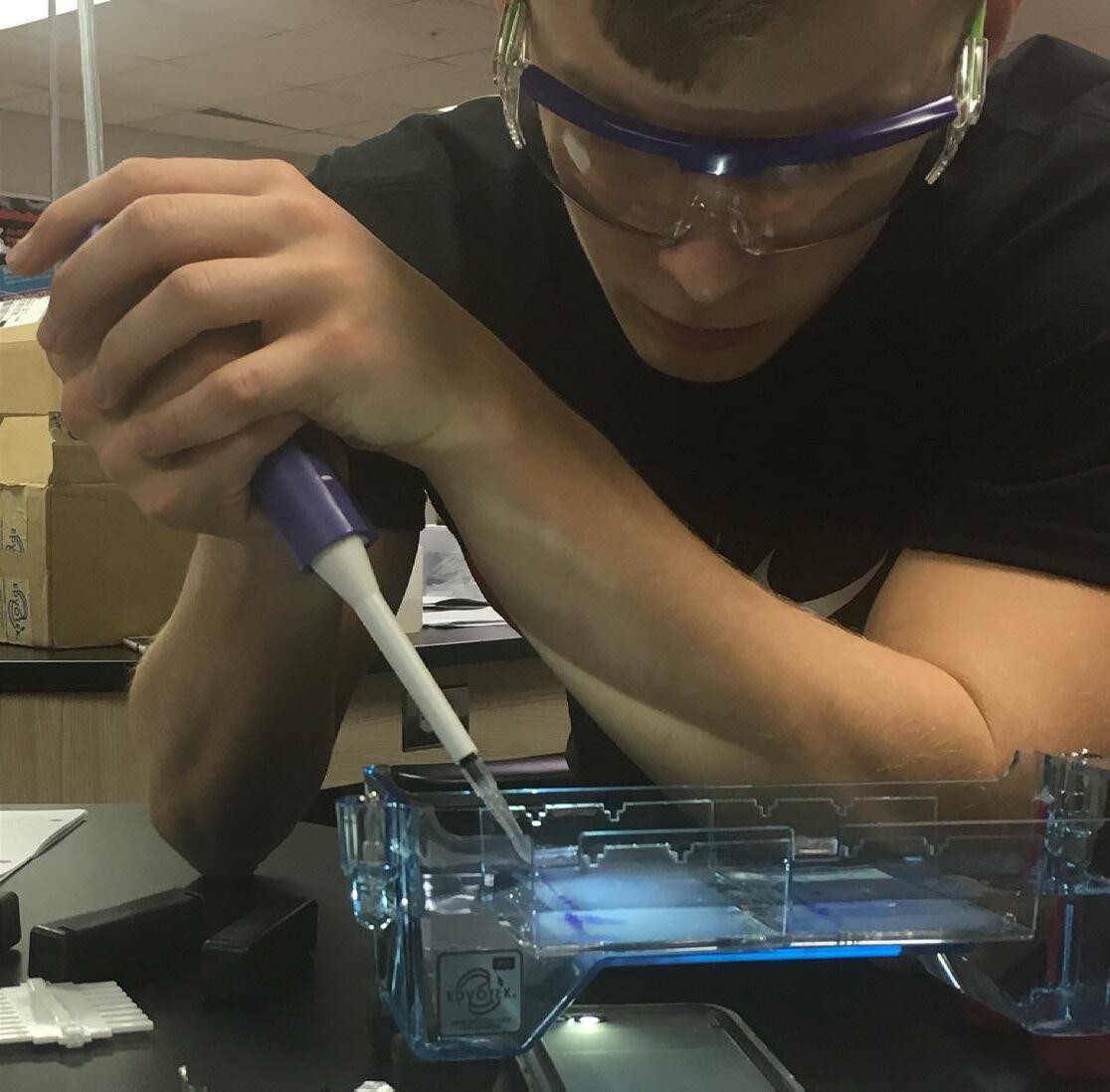

• perform agarose gel electrophoresis to separate different sized dye molecules
• load, run, and analyze simulated crime scene and suspect samples
Participants use drinking straws, clay, and index cards to design a rocket and launch it from a simple yet efficient rocket launcher that uses pneumatic force created by releasing a weighted drop rod in a cylinder. A variety of STEM driven activities will be used with the rockets and launchers to build the skills of students in the areas carrying out scientific inquiry, participating in the design process, and using appropriate tools and techniques to gather, analyze and interpret data.

Effective questions can be the vehicle that transport students from what they know to what they need to know. Productive questions foster discussion, promote critical reasoning skills, and launch inquiry projects that empower students. This workshop will help participants refine their questioning skills and work toward building a classroom climate of thinking that promotes deeper learning.

Teachers will learn to fly the drones, from assembly to launching. They will use iPads to fly the drones around a specific course including takeoff and landing. Teachers will learn to perform aerobatics with the drones and then practice improving their flying proficiency and comfort with drones. Student focus will be on motion of objects and forces applied and coding.


Each of these electronic modules are preprogrammed to perform unique functions. The modules snap together in circuit to create innovative solutions or artistic expressions envisioned by the inventor. Craft materials and/or recyclables used for construction are given additional dimension as littleBits modules incorporate light, sound, and movement to any creation.
Utilize STEAM To Solve A Real-World Problem. An exploration of identifying a hyperlocal, authentic issue that students will experience, explore, and attempt to solve by applying STEAM skill sets. Participants will learn about messy problems, how to find problems, and to design and manage a project that empowers students as they realize that they can make an immediate impact in their community and ultimately leave their world a little better than they found it.

Students will gain a deeper understanding of science through a combination of daily demonstrations and highly interactive experi ments that utilize interfaces, sensors, software, and lab books to help engage and excite through hands-on scientific investigation.
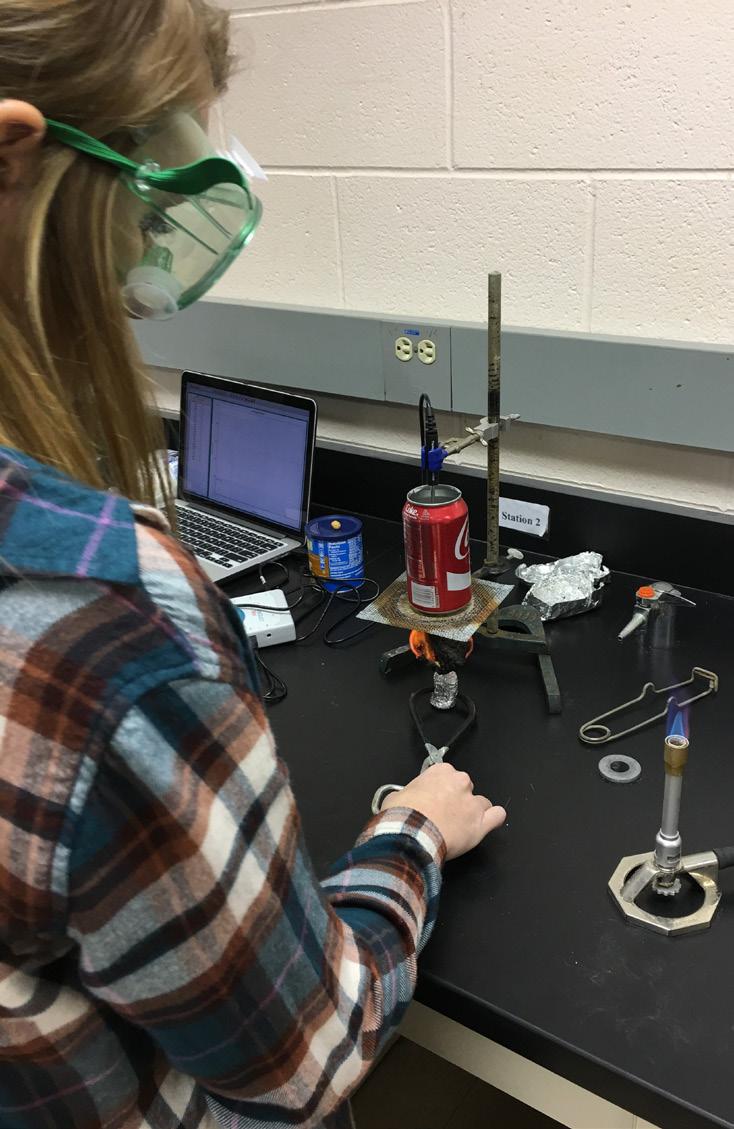
These activities teach critical scientific concepts, encourage scientific problem-solving, and support a love of science. Participants in the training will learn how to operate the Labquest data collection hub and explore the numerous sensors that are available. We will also examine the Vernier labs and explore taking existing labs to the next level by incorportating these sensors.
These materials are adaptable for most grade levels and are suited for chemistry, physics, biology, or engineering labs. They are avail ble through the June Harless Center Lending Library after training is complete.
Project WET is an international, interdisciplinary water science and education program for educators of all sorts. The program addresses atmospheric water, surface water, groundwater, cultural and historic uses of water, and contemporary management issues such as stormwater and nonpoint source pollution. By complementing existing curriculum, Project WET correlates with (and helps educators meet) state and nation standards, while strongly supporting STEM principles. Project WET activities are interdisciplinary, hands-on, and engaging to make water education fun for students and teachers. Upon completion of the full day session, participants will be given the Project Wet activity book.
Project Learning Tree is a nationwide award-winning environmental education program that acts as a “window to the world” to engage children in learning – both inside and outside.


Individuals participating in Project Learning Tree are professionally trained in effective and engaging methods for teaching youth about the world around them and their place within it. Children from preschool through 12th grade benefit from the hands-on learning that helps them excel in reading, writing, math, science and social studies. Students gain awareness of their surroundings. They learn how to think critically and responsibly,
and they learn to respect the opportunities our trees and forests provide, as well as the protection they require. Upon completion of
the session, participants are given the Project Learning Tree activity book.


“Project WILD is a standards-based program providing wildlife-based conservation and environmental education fostering student interest in responsible actions toward wildlife and related natural resources. All curriculum materials are backed by sound educational practices and theory, and represent the work of many professionals within the fields of education and natural resource management from across the country.” Upon completion of the session, participants are given the Project Wild activity book.
This project is a group project for middle school and high school students. The project is based on the fictional town of Fruitvale that has a creek running through it. It is discovered that there is a harmful chemical in the water based on a dog having gotten sick from drinking from the creek. The students are presented with graphs and charts of the town, including topographic data and data pertaining to the geological make-up of the regions surrounding the wells in the town. Students have to determine where the chemical has entered the creek by analyzing the charts and maps and by experimenting to find
out how the chemicals could have flowed from the wells in question into the creek. The student groups will be given an allotment of fake money to spend on testing wells and different filtering techniques. This allotment of money will require the groups to analyze the situation carefully before spending their money. Once the group has determined what they believe caused the contamination, they will be presented with several different options for clean-up. They will then determine the option they agree upon and present their findings in a town hall meeting.
Students discover their inner designer while learning to think and act like engineers. Blocks allow children to build extemporaneously using their imagination and creativity while teaching the Engineering Design Process to prototype, improve and iterate their designs. With Rokenbok, educators mentor students to develop foundational capacities prerequisite to all STEM learning, like spatial reasoning, problem-solving, and symbolization. While many students learn these fluencies at home, this phase helps fill in critical gaps that may exist, especially for underserved students. Students begin exploring applied mathematics, mechanical engineering, and robotics as they focus on intuitive concepts like how to make things strong and how to make things move. As a result, they gain confidence in their ability to use technology to design solutions to problems and see themselves as critical thinkers and inventors.

This creative platform features small sphere-shaped robots that can be programmed three different ways to move, produce sound, and emit light. Used with the Sphero app, elements of design and engineering are fueled by these robots that can become the engine of any imagined land or water transport, the navigator of labyrinth-like mazes, or programmed paintbrushes on canvas.
Sphero is far more than a robot. This robotics system is “designed to inspire curiosity, creativity, and invention through connected play and coding.” Sphero is an app-enabled, self-contained robotics system working through a coding platform with a sophisticated set of sensors used for measuring forces and gathering data.
The Sphero SPRK+ power packs are available through the June Harless Center lending library.
This session is a component of a larger professional learning series revolving around supporting literacy in the science classroom. As science teachers, we try to apprentice our students into the daily routines of scientists. Literacy strategies can help provide depth to the content and support students as they learn to think, talk, write, and do science.
Teachers do not need to become literacy specialists or integrate literacy at the expense of their content. They do need to provide students with opportunities to learn science through language. Participants will enhance their ability to identify and enact these opportunities and learn strategies that help students effectively read and analyze diverse science texts.
The Marshall University June Harless Center for Rural Educational Research and Development was established in 2001 with a mission to provide leadership in education initiatives for West Virginia educators and students. The Center provides educators and families of rural West Virginia with a support system that addresses educational problems, initiates and sustains school improvement, and provides positive growth in all educational factors.
The Harless Center’s work has been enhanced by county and school partnerships purposefully established to focus on benefits for teachers, administrators, and students. The goal of the work is ultimately higher student achievement as a direct result of highly effective teachers and highly motivated and engaged students in relevant and rigorous assignments.
The Harless Center team is comprised of a diverse group of experienced professionals who have

served in various capacities outside and within the PK-18 system. Our staff members have developed exemplary professional learning in every curricular area and in numerous delivery methods as well as instructional programs for students that provide for exciting, engaging, and productive classrooms. Our staff has experience in identifying educational issues, devising action plans, and supporting the transformation of educational systems.
Visit our website or scan the QR code to learn more.
June Harless Center for Rural Educational Research and Development
One John Marshall Drive Education Building 228 Huntington, WV 25755 (304) 696-2945
